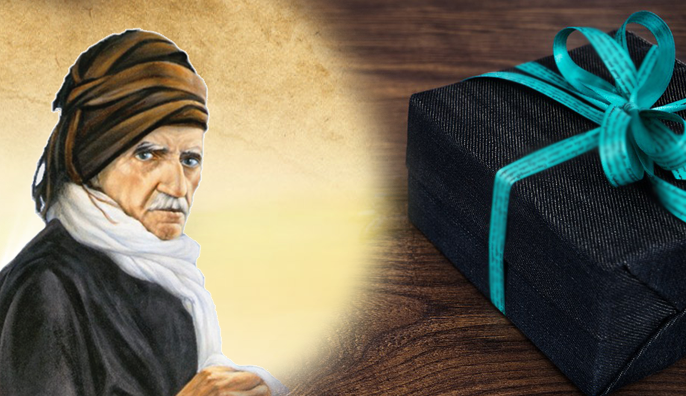بِاسْمِهِ سُبْحَانَهُ
وَاِنْ مِنْ شَىْءٍ اِلاَّ يُسَبِّحُ بِحَمْدِهِ
This is part of a letter written in response to a gift from his well-known student, Hulusi Yahyagil.
T h i r d l y : You sent me a present and want to break an extremely important rule of mine! Just this time I am not going to say: “I don’t accept presents from you in the same way that I don’t accept them from Abdülmecid and Abdurrahman, my brother and nephew,” because since you are more advanced than them and closer in spirit, I can’t refuse them even if I refuse everyone else’s. But apropos of this, I shall tell you the reason for my rule. It is like this:
The Old Said never accepted favours. He preferred death to becoming obliged to people. He never broke that rule of his despite suffering great hardship and difficulty. This wretched brother of yours inherited this characteristic from the Old Said, and it is not asceticism or artificial self-sufficiency; there are four or five important reasons for it:
The First: The people of misguidance accuse religious scholars of securing advantage through their learning. They attack them unfairly, saying: “They are exploiting knowledge and religion to make a living for themselves.” This has to be shown to be false in practice.
The Second: We are charged with following the prophets in disseminating the truth. In the All-Wise Qur’an those who do this say:
إِنْ اَجْرِىَ إِلاَّ عَلَى اللهِ إِنْ اَجْرِىَ إِلاَّ عَلَى اللهِ
and they display independence. Most meaningful in regard to this matter is the verse in Sura Ya. Sin.:
اِتَّبِعُوا مَنْ لاَ يَسْئَلُكُمْ اَجْرًا وَهُمْ مُهْتَدُونَ
The Third: As is explained in the First Word, one should give in the name of Allah and take in the name of Allah. Whereas mostly either the one giving is heedless and gives in his own name and implicitly puts the recipient under an obligation, or the recipient is heedless; he gives the thanks and praise due to the True Provider to apparent causes and is in error.
The Fourth: Reliance on Allah, contentment, and frugality are such a treasury and wealth they can be exchanged for nothing. I do not want to take things from people and shut up that inexhaustible treasury. I offer endless thanks to the All-Glorious Provider that since my childhood He has not compelled me to remain under obligation and so suffer abasement. Relying on His munificence, I beseech His mercy that I may remain faithful to this rule for the rest of my life.
The Fifth: In consequence of many signs and experiences over the past year or two I have formed the firm conviction that I am not permitted to accept people’s goods and particularly the gifts of the rich and of officials. Some make me ill. Indeed, they are made to be like that; they are made so that I cannot eat them. Sometimes they are turned into a form that upsets me. This must be a sort of command not to accept the goods of others, prohibiting me from accepting them. Moreover, I have a need for solitude, I cannot receive everyone all the time. Accepting people’s gifts necessitates considering their feelings and accepting them at times I do not want to. And I do not find that agreeable. I find it more agreeable to eat a small piece of dry bread and wear clothes patched in a hundred places, and be saved from fawning and artificiality. It is disagreeable for me to eat the best quality baklava and wear the finest clothes at the hands of others and be obliged to consider their feelings.
The Sixth: The most important reason for self-sufficiency is what Ibn Hajar, the most reliable scholar of our school of law, says: “If you are not righteous it is forbidden to accept something intended for the righteous.”
Out of their greed and ambition, the people of this age sell the smallest gift very expensively. They imagine a sinful wretch like myself to be righteous or a saint and they give him a loaf of bread. If, Allah forbid, I consider myself to be righteous, it is a sign of pride and points to the absence of righteousness. If I do not consider myself to be righteous, it is not permissible to accept those goods. Also, to receive alms and gifts in return for actions that look to the hereafter, means consuming the eternal fruits of the hereafter in transitory form in this world.
اَلْبَاقِى هُوَ الْبَاقِى
Said Nursi
Source: 2nd Letter, Letters, Risale-i Nur Collection.
1356 Viewed


